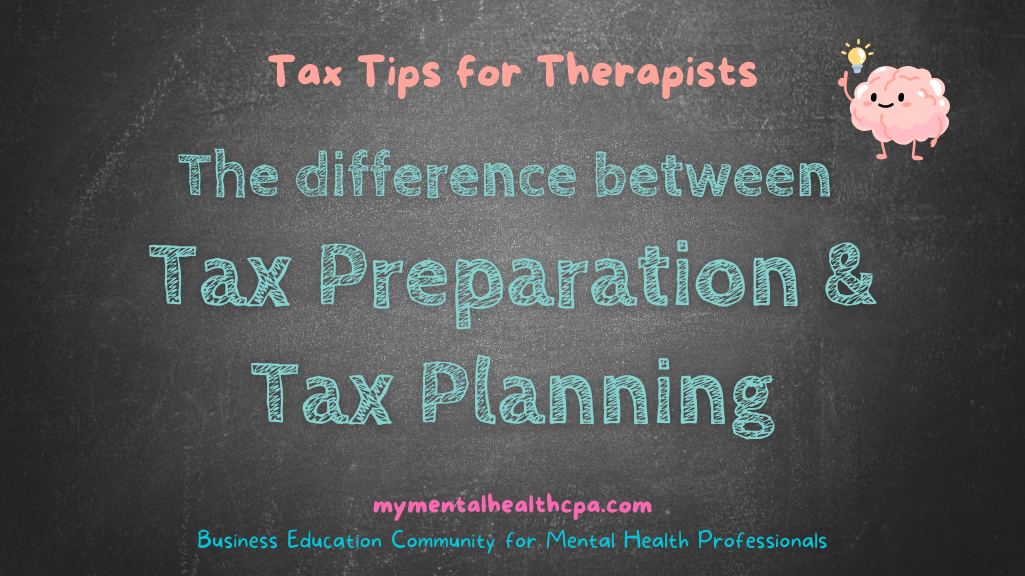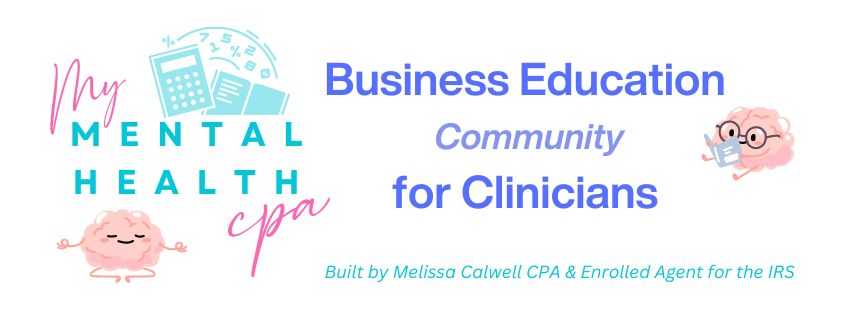August 30, 2024
Tax Preparation vs. Tax Planning for Therapists

Tax Preparation vs. Tax Planning for Therapists: What’s the Difference?
When speaking with therapy practice owners, one common reason they leave their current tax firm is the lack of proactive guidance. Many therapists are seeking ways to avoid being blindsided at tax time and optimize their finances throughout the year. The key to this is understanding the difference between tax preparation and tax planning for therapists.
How is Tax Preparation different than Tax Planning for Therapists?
Tax preparation is something most therapists are familiar with—it’s the annual task of compiling financial records from the previous year and preparing your tax return. The primary goal is to ensure your tax return is accurate, complete, and filed on time with the IRS and any relevant state agencies.
During tax preparation, a professional will:
- Gather and organize documents such as W-2s, 1099s, and receipts.
- Identify eligible deductions and credits based on the previous year’s activities.
- Calculate your tax liability or refund.
- File your return to meet all legal deadlines.
Tax preparation is a reactive process, addressing financial activities after they occur to accurately report income, expenses, and minimize tax liability. However, without an ongoing tax strategy, therapists may miss opportunities to save money throughout the year.
What is Tax Planning for Therapists?
On the other hand, tax planning for therapists is a proactive approach that looks ahead to your current and future financial situation. The goal is to develop strategies to minimize your future tax liabilities, optimize cash flow, and align your tax plan with your broader financial goals.
During tax planning, a professional will:
- Review your current financial status and anticipate changes, such as shifts in income, investments, or life events.
- Identify tax-saving opportunities through deductions, credits, and other strategies.
- Provide guidance on estimated tax payments to avoid penalties.
- Recommend tax-efficient strategies for retirement, investments, and practice growth.
Tax planning for therapists involves making informed decisions throughout the year, allowing you to seize tax-saving opportunities and align your strategy with your practice’s long-term goals.
Why Therapists Need Both Services
While tax preparation and tax planning are separate services, they complement each other. Many therapists believe that filing taxes annually is sufficient, but without proactive tax planning, they risk missing out on valuable savings and strategies.
- Tax preparation ensures compliance with tax laws and avoids penalties for incorrect filings.
- Tax planning for therapists helps reduce your tax burden by creating strategies that support long-term financial success.
By engaging in both tax preparation and tax planning, therapists can simplify tax season, reduce stress, and eliminate surprises.
How to Start Incorporating Tax Planning
If you’ve been focusing only on tax preparation, it’s time to integrate tax planning into your financial strategy. Proactively managing your taxes allows you to control your situation and avoid being blindsided at tax time.
At My Mental Health CPA, in collaboration with Fortitude Tax & Accounting, we offer both tax preparation and tax planning services tailored for therapists. Whether you need accurate, on-time filing or a comprehensive tax strategy, we’re here to help.
When Should Therapists Start Tax Planning?
The best time for tax planning is from August to October. By this time, therapists have a clearer picture of their financial performance for the year, and there’s enough time to plan cash flow and implement tax-saving strategies before the year ends.
Ready to Enhance Your Tax Strategy?
Contact Fortitude Tax & Accounting today to schedule a tax planning session and discover how proactive tax planning can benefit your therapy practice.
This article is for informational purposes only and does not constitute legal, business, or tax advice. Please consult with your advisors for advice specific to your situation.
Q: What’s the difference between tax preparation and tax planning for therapists?
A: Tax preparation is the annual process of preparing and filing your tax return based on last year’s financial records. Tax planning, however, is a proactive approach that focuses on strategies to minimize future tax liabilities and align with your practice’s long-term financial goals.
Q: When should therapists start tax planning?
A: The ideal time to begin tax planning is from August to October, when you have a clearer picture of your financial performance for the year. This gives you ample time to implement tax-saving strategies before the year ends.
Q: Can tax planning help reduce tax liability for therapists in private practice?
A: Yes, tax planning allows therapists to reduce their tax liability by taking advantage of deductions, credits, and other strategies tailored to their specific financial situation. This proactive approach can result in significant savings over time.
Q: Do therapists need both tax preparation and tax planning?
A: Yes, both services are essential. Tax preparation ensures compliance with tax laws and avoids penalties, while tax planning helps optimize your financial strategy to minimize future tax burdens and support your practice’s growth.
About the Author
Melissa Calwell is a licensed CPA and EA with years of experience helping therapists and mental health professionals manage their finances and optimize tax strategies. As the founder of My Mental Health CPA and Fortitude Tax & Accounting, Melissa Calwell is passionate about empowering therapists to focus on their purpose by taking the stress out of financial management. Whether you’re looking for proactive tax planning or accurate tax preparation, Melissa Calwell provides customized solutions designed to support your practice’s growth.




Leave a Reply